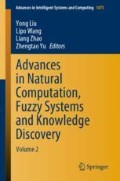Abstract
Soft subspace clustering (SSC) methods can simultaneously performance clustering and find the subspace where each cluster lie in. A Minkowski metric based SSC (MSSC) algorithm recently is proposed to improve the adaptability of SSC to data. The empirical results have shown its favorable performance in comparison with several other popular clustering algorithms. However, this algorithm has the following two main defects: (1) The role that the Minkowski exponent \(\beta \) in MSSC plays is not clear. And the Minkowski exponent \(\beta \) is set as the same as the feature weight exponent \(\alpha \) in MSSC that may lead to MSSC missing better clustering performance. (2) the steepest descent method based MSSC (SD-MSSC) is computationally expensive for large data. In this paper, a general formulation for MSSC is presented, in which the Minkowski exponent \(\beta \) can be set not equal to the feature weight exponent \(\alpha \). A novel algorithm for computing the clustering centroids in MSSC is presented using the fixed-point iteration (FPI) method. The FPI based MSSC (FPI-MSSC) algorithm is more efficient than the SD-MSSC algorithm, and it becomes a noise-robust SSC procedure when the \(\beta <2\). Extensive experiments on real-world data sets are presented to show the effectiveness of the proposed algorithm.
Access this chapter
Tax calculation will be finalised at checkout
Purchases are for personal use only
References
Jain, A.K., Dubes, R.C.: Algorithms for Clustering Data. Prentice Hall, Englewood Cliffs (1988)
Mac Queen, J.: Some methods for classification and analysis of multivariate observations. In: Fifth Berkeley Symposium on Mathematical Statistics and Probability, pp. 281–297 (1967)
Chan, E.Y., Ching, W., Ng, M.K., Huang, J.Z.: An optimization algorithm for clustering using weighted dissimilarity measures. Pattern Recogn. 37, 943–952 (2004)
Frigui, H., Nasraoui, O.: Unsupervised learning of prototypes and attribute weights. Pattern Recogn. 37, 567–581 (2004)
Deng, Z., Choi, K., Chung, F., Wang, S.: Enhanced soft subspace clustering integrating within-cluster and between-cluster information. Pattern Recogn. 43, 767–781 (2010)
Amorim, R.C., Mirkin, B.: Minkowski metric, feature weighting and anomalous cluster initializing in K-Means clustering. Pattern Recogn. 45, 1061–1075 (2012)
Bezdek, J.C.: Pattern Recognition with Fuzzy Objective Function Algorithms, pp. 95–107. Plenum Press, New York (1981)
Chiang, M.M., Mirkin, B.: Intelligent choice of the number of clusters in k-means clustering: an experimental study with different cluster spreads. J. Classif. 27(1), 1C38 (2010)
Maronna, R.A., Martin, D.R., Yohai, V.J.: Robust Statistics: Theory and Methods. Wiley, New York (2006)
Asuncion, A., Newman, D.J.: UCI machine learning repository. University of California, School of Information and Computer Science, Irvine (2007). http://www.ics.uci.edu/~mlearn/MLRepository.html
Acknowledgments
This work is supported by the National Science Foundation of China (Grant nos. 61671377, 61102095, 61571361 and 11401045), and the Science Plan Foundation of the Education Bureau of Shaanxi Province (No. 18JK0719), and New Star Team of Xi’an University of Posts and Telecommunications (Grant no. xyt2016-01).
Author information
Authors and Affiliations
Corresponding authors
Editor information
Editors and Affiliations
Rights and permissions
Copyright information
© 2020 Springer Nature Switzerland AG
About this paper
Cite this paper
Zhi, X., Bi, L. (2020). Minkowski Metric Based Soft Subspace Clustering with Different Minkowski Exponent and Feature Weight Exponent. In: Liu, Y., Wang, L., Zhao, L., Yu, Z. (eds) Advances in Natural Computation, Fuzzy Systems and Knowledge Discovery. ICNC-FSKD 2019. Advances in Intelligent Systems and Computing, vol 1075. Springer, Cham. https://doi.org/10.1007/978-3-030-32591-6_12
Download citation
DOI: https://doi.org/10.1007/978-3-030-32591-6_12
Published:
Publisher Name: Springer, Cham
Print ISBN: 978-3-030-32590-9
Online ISBN: 978-3-030-32591-6
eBook Packages: Intelligent Technologies and RoboticsIntelligent Technologies and Robotics (R0)

